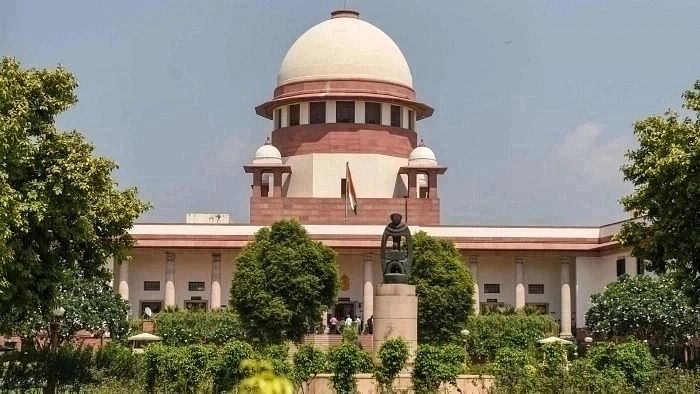
Supreme Court.
Credit: PTI File Photo
The Supreme Court has held that neither is it mandatory for a magistrate to determine if a defamation complaint filed before it fell under the exception of the penal provision nor is he precluded from considering if at all any of the exceptions is attracted in a given case.
A bench of Justices Bela M Trivedi and Dipankar Datta said when the trial court issued summons to accused on a defamation complaint, two aspects were required to be satisfied, whether the uncontroverted allegations as made in the petition of complaint read with the examination of the complainant, prima facie, tend to suggest an offence having been committed, and whether it is expedient and in the interest of justice to proceed.
"What the law imposes on the magistrate as a requirement is that he is bound to consider only such of the materials that are brought before him in terms of Sections 200 and 202 CrPC as well as any applicable provision of a statute, and what is imposed as a restriction by law on him is that he is precluded from considering any material not brought on the record in a manner permitted by the legal process," the court said.
The court said if the materials themselves disclosed a complete defence under any of the exceptions, nothing prevented the magistrate to check a frivolous complaint from triggering an unnecessary trial, since initiation of prosecution is a serious matter.
"It would be the duty of the magistrate to prevent false and frivolous complaints eating up precious judicial time. If the complaint warrants dismissal, the magistrate is statutorily mandated to record his brief reasons," the bench said.
Similarly, when a plea is filed for quashing such complaints under Section 482 of the CrPC, the bench said, "The High Courts can go no further and enlarge the scope of inquiry if the accused seeks to rely on materials which were not there before the magistrate. This is based on the simple proposition that what the magistrate could not do, the High Courts may not do."
The top court explained the power of the magistrate and the High Court on defamation complaint.
"Issue of process under Section 204 read with Section 200, CrPC does not ipso facto stand vitiated for non-consideration of the exceptions to Section 499, IPC unless, of course, before the High Court it is convincingly demonstrated that even on the basis of the complaint and the materials that the magistrate had before him and without there being anything more, the facts alleged do not prima facie make out the offence of defamation and that consequently, the proceedings need to be closed," the top court said.
It dismissed an appeal filed by M/s Iveco Magirus Brandschutztechnik GMBH and others against the Delhi HC's order of December 10, 2010, rejecting their plea to quash the summons issued against them in defamation complaint by a Delhi court on March 25, 2010.
The accused were alleged to have made defamatory allegations in letters sent different authorities with regard to tenders issued to Nirmal Kishore Bhartiya's company Bhartiya Vehicles & Engineering Pvt Ltd, the Indian associate of one Rosenbauer International AG for supply of 40 Airfield Crash Fire Tenders at various airports.
In the case at hand, the bench said, "it does not appear to us that the finding of a prima facie case having been made out at that stage is so outrageously illogical or in defiance of legal principles and acceptable standards that it would merit interference by this court."
